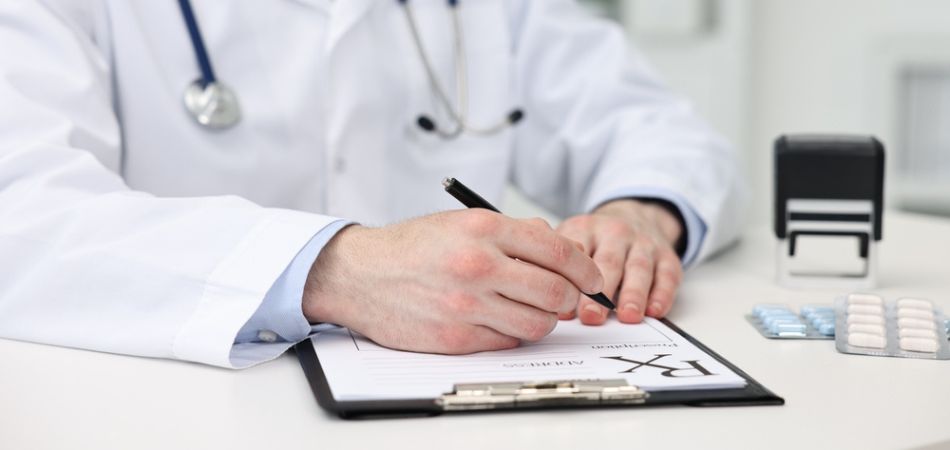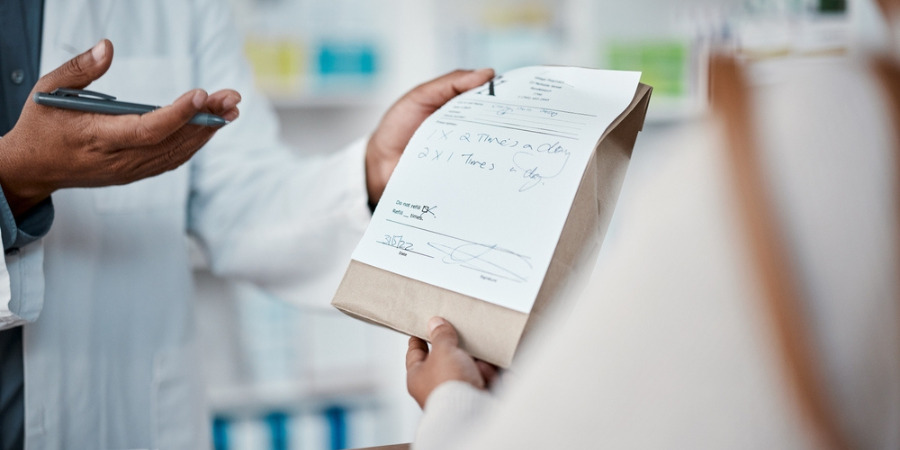Last Updated:
November 25th, 2025
Research from YouGov shows that over half of all people in Britain are currently taking prescription medication. Prescription drugs are a household item for almost everyone, yet many of us overlook the propensity for addiction-forming in the medicines we are given.
We’re looking at the ways drugs that are intended to heal can silently evolve into a source of pain and dependence. We’ll give you signs to look for that prescription addiction is taking hold, and ways you can safely work your way out of addiction’s vice-like grip.
What is prescription drug addiction?
Prescription drug addiction happens when medications begin to control more of your life than you, or a healthcare professional, ever intended. A medicine may have been given by a GP, hospital doctor, nurse, or pharmacist to give relief for a genuine concern. However, over time, the line between “treatment” and “dependence” can blur, often faster than the person taking it realises.
After a period of prescribed use, a person may have intense urges to continue use, even if their prescribers earnestly advise against it. When physical or emotional states depend on the next time they take the substance, it’s time to ask: Is this still helping me, or is it quietly hurting me?
What are the most commonly prescribed drugs?
The number of people receiving prescription medication may be higher than most of us first think. According to data from the UK Government, more than 10 million people in England (more than a quarter) receive one or more prescription drugs each year. Their report shows that the most commonly prescribed drugs in the country are:
- Antidepressants: 7.3 million people (17% of the adult population)
- Opioid pain medicines: 5.6 million (13%)
- Gabapentinoids: 1.5 million (3%)
- Benzodiazepines: 1.4 million (3%)
- Z-drugs: 1.0 million (2%)
All of these drugs carry varying potentials for abuse and addiction-forming, from mild to high. Understanding opioid addiction in particular may be most crucial, as opioid pain medicines top the list of most prescribed and most misused.
Prescription drugs – where “lifesaving” and “life-altering” converge
Prescription medications are, at their best, remarkable tools for improving health and prolonging life. For millions, they can restore physical balance after illness or ease tormenting mental health conditions.
Yet, drugs that are prescribed in completely legitimate settings can also have a high propensity for addiction-forming, entangling a person in long-term physical and psychological dependence.
Why do prescribed medications become long-term sources of addiction?
A few reasons prescribed medication may form an addiction include:
- Increasing tolerance: A person may start taking the medication exactly as prescribed, with no abuse and no misuse. But as the body adapts and tolerance builds, doses might creep up. The brain becomes wired to expect the drug. Missing a dose brings discomfort. And soon, what began as a path to wellness can spiral into something more dangerous.
- The doctor-patient relationship: There is also the matter of the trust we place in a doctor’s advice, and how much the doctor trusts the patient who is speaking to them. It is always best to follow the guidance of a qualified healthcare professional, but as the prescribed course evolves, a drug used for treatment may become a source of growing recreational pleasure.
- Softened societal stances: Unlike addictions to many illicit drugs, a prescription addiction may be more likely to hide in plain view. If you were to see a friend or work colleague taking medicine, and they told you it was prescribed because of a current condition, you probably wouldn’t ask them to prove it.
- Withdrawal symptoms: Your prescriber should tell you of withdrawal symptoms that are likely to happen as you taper off your prescription. However, no two withdrawal experiences are identical, and a person may be deeply struggling to manage their arising symptoms as they stop taking.
Importantly, we should highlight that these reasons do not show weakness in a person’s willpower. They make suggestions on the power that many prescription medications hold, and how easily the original purpose of a prescription can be influenced as dependence takes hold.
Warning signs you may be addicted to your prescription
If you or someone close to you has been taking prescription medication and has started to wonder if the forces of addiction are at play, there may be some indicators you can look for.
- Needing higher doses to get the same effect: For almost every drug used in prescription, your body will adapt to its presence over time and build its own tolerance towards it.
- Feeling anxious or irritable without the medication: Ask questions to yourself like: Exactly how would I feel if I stopped taking this drug? Aside from its prescribed use, would you start to feel irritable without it?
- “Doctor Shopping” or hoarding prescriptions: The colloquial term “Doctor Shopping” means a person looks for multiple doctors to get prescriptions for the same or similar drugs, often for non-medical reasons. Stockpiling pills or going to extreme lengths for a steady supply are strong indicators of an addiction forming.
- Using medication to escape emotional discomfort: Taking our prescription not just for physical symptoms but to numb sadness, anxiety, or stress can be a slippery slope into misuse.
How to break free from prescription drug addiction
If you’re struggling to escape an addiction that started as a prescription, please know that you are not alone, and your cause is never lost. Some of the best ways you can safely get out of addiction include:
Medical detox tailored to your prescription history
Professional detox suited to your prescription history will be much safer than going it alone. Detoxing safely from medication is more easily achievable with the guidance of a trained professional. They will understand the importance of gradual tapering to ease your body off the drug and avoid triggering severe withdrawal. In the hands of recovery professionals, any worsening symptoms or complications are met with evidence-based care and understanding.
Therapy for underlying pain, trauma, or anxiety
Often more deeply-rooted than physical detox, therapy helps many people who are struggling with a substance that started as a prescription. Most people continue using prescription drugs for legitimate reasons, like chronic pain or emotional distress. Yet, without psychologically addressing many of the drivers, the potential for addiction only grows. Trauma-informed therapy and Cognitive Behavioural Therapy are some of the best models to help people not only remove the drug, but also understand what is driving use in the first place.
Rebuilding trust in your body and mind without meds
More holistically speaking, rehab for prescription drug dependency can help you restore eroded confidence and lay the groundwork for a sober future, where you truly are in control. We should not underestimate the trust and care we place in looking after our body and mind, and rehab will help you with this. Mindfulness and practices like yoga and breathwork help you reconnect with your physical self. Your sleep, nutrition and exercise routines can all be developed to support chemical balance in the brain. Remember that you are not tearing down every wall and rebuilding from scratch. You are often supported in developing existing routines, as well as encouraged to learn new, healthy coping mechanisms.
Where can I get help for an addiction that is ruining my life?
If you’re reading this and feeling the weight of prescription drug addiction, please know you are not alone. Many people have found themselves trapped by the very medication that was meant to help them, but recovery is possible, and support is waiting for you.
At Recovery Lighthouse, we specialise in medically-assisted detox that’s tailored to your prescription history. We incorporate therapy that addresses both dependency and emotional pain, and set up aftercare services that support you for life.
Don’t wait longer than you need to. Contact Recovery Lighthouse today to take your first step towards a brighter future, free from the shackles of drug addiction.
(Click here to see works cited)
- Dinic, Milan. “The Yougov Big Survey on Drugs: Prescription Drugs.” YouGov, YouGov, 24 Jan. 2022, yougov.co.uk/society/articles/40279-yougov-big-survey-drugs-britons-taking-prescriptio.
- “Prescribed Medicines Review: Summary.” GOV.UK, www.gov.uk/government/publications/prescribed-medicines-review-report/prescribed-medicines-review-summary.



